- Home
- Julia London
Hard-Hearted Highlander--A Historical Romance Novel Page 8
Hard-Hearted Highlander--A Historical Romance Novel Read online
Page 8
No one said a word. The two children stared at him, and Rabbie stared back. He didn’t know what to say to them, and at last, he spoke to them in Gaelic. Did they speak English? “I, ah... I knew your mother.”
The lad looked up at that admission.
“I donna remember her,” the girl announced in English. “Mrs. Maloney said I look very much like her. She was bonny and so am I.”
“Aye, she was, as are you,” Rabbie agreed. The lass—Fiona—must be five or six years old now. Ualan was nearly two when last Rabbie had seen him, and he guessed him to be seven or eight years now. “She loved you both,” he said.
Fiona smiled. The lad didn’t utter a word.
“I knew them all,” Rabbie said, and was embarrassed to hear his voice crack. “I even knew the two of you.”
Fiona’s eyes widened. “You did? I donna remember you.”
“You were a bairn, lass,” he said to her in English. “You played here at Balhaire, aye?”
The children stared at him. Perhaps they didn’t believe him. He began to perspire; he could feel a bead of it running down his back. As he gazed into those vaguely familiar faces, he could see Gavina and Seona’s eyes in the children. He could see the lad’s father in him, in his rust-colored hair, just like that of Donald MacLeod.
Barabel returned to the kitchen with a flagon. “Why do you stand idle?” she chastised the children as she handed Rabbie a flagon of whisky. “Finish your chores, the both of you,” she commanded.
Rabbie had glanced once more at the children before leaving. He was disquieted by their presence. What was to happen to them? Perhaps he didn’t want to know—to know would require some action on his part, at the very least, some thought or feeling. He couldn’t summon the strength for it that evening.
He’d taken the flagon to the top of the fortress tower, and there he had crouched on the parapet, drinking to numb the hopelessness in him. He’d absently viewed the bailey below—quite a fall that would be—but he didn’t think of jumping.
At least not that night.
No, he’d found himself instead thinking first of those orphaned children, and then of the woman with the dark hair and hazel eyes and deep red gown. Or rather, he’d thought of the way she’d glared at him. With disdain. As if she had the right to disdain him. Somehow, the maid and the children became tangled in his muddied thoughts. He was angry that she could possibly find fault with him when there were two children working in the scullery because of the English forces.
The cold eventually sent him inside, long after that haughty little Sassenach had left Balhaire, long after the candles had been extinguished and everyone had gone to bed. And then he’d tried to sleep.
It was impossible.
It puzzled him—how could a man desire sleep so utterly above all else, and yet be unable to achieve it? But between his perpetual anguish and the hazel eyes burning their disdain into his mind’s eye, he’d slept very little. Frankly, he wasn’t certain if he’d slept at all in the last two days.
And now had come the day he’d be forced to take the chit riding.
Why did women believe it such a bonny pastime to amble aimlessly about the countryside? Even when he was in good spirits he chafed at the futility of such exercise. And, naturally, his family distrusted him so completely that Catriona had once again been dispatched to chaperone him. She was leading the charge, and she determined a picnic was the thing. She’d asked Barabel to prepare a basket for them. A picnic!
“It’s a bonny day,” she’d said when Rabbie had complained. “She will like it.”
Rabbie didn’t picnic.
Aye, but he’d resigned himself to it. Even his father had lost patience with Rabbie’s surly apathy, chastising him this morning for having left the room the other night without bidding their guests good-night.
Truthfully, Rabbie had lost patience with himself. It wasn’t as if he enjoyed his state of mind, but it was beyond his ability to affect. He struggled to shepherd his thoughts in a brighter direction. He couldn’t seem to move them at all. It was as if a boulder had been placed before him, and until he could push it away, he was destined to stand still. No matter what he did, no matter how he prayed or swore that this day would be different, he could not move that boulder of melancholy. It grew bigger and heavier every day.
And today was no different.
He was to meet Catriona on the road. She’d gone to call on their father’s cousin, whom they called Auntie Griselda. Quite unfortunately, she was failing. Catriona was especially close to Zelda, and visited her every day. While he restlessly waited, his thoughts spinning, Rabbie had ridden to the cliff above the cove. Now, here he stood, his toes just over the edge.
The tide was out, and from his vantage point he could see how the color of the water below him changed from green to dark blue where it deepened. If he leaped, spread his arms, he would sail out far enough to land in that hole. If he weighted his pockets with rocks, he would sink so far below the surface they might never find him.
He would disappear, like Seona, never to be heard from again.
The task of picking up rocks seemed too complicated and tiring.
Rabbie sighed, then wondered after the time. It was morning yet, the sun not fully overhead. Catriona would be furious with him if he was late. Not that Rabbie cared. He almost welcomed her fury—it served to test the boundaries of his desolation. He longed for something that would force him to feel anything other than rage, or despair, or the worst—absolutely nothing.
His only saving grace, he supposed, was that he did not want to find that thing at the expense of his family. He had told himself that his sole task today, the one thing he must accomplish, was to ride with the English lass to Auchenard, a hunting lodge that belonged to Daisy’s young son, Lord Chatwick. It had been entrusted to Rabbie to keep in good repair until Ellis had reached his majority. It was scenic, Catriona said. The girl would like it, Catriona said.
A wind suddenly gusted up from the cove, pushing him, lifting the hem of his cloak and his hair, which he hadn’t bothered to put in a queue. Rabbie quickly stepped back from the edge, his heart pounding with the abrupt surprise of that gust. And yet, wasn’t that what he’d wanted? For a gust of wind to topple him from this ledge?
He didn’t want to think about it, not now, not with the task upon him, and turned away from the edge of the cliff. That’s when he saw her. The maid with the penetrating hazel gaze.
She was standing down the path a few feet from him, from where she could plainly see him. How long had she been standing there? Had she understood he was contemplating the end?
His question appeared to be answered when she abruptly turned and hurried down the path, her gait awkward. It was a moment before he realized she was running from him. It disconcerted him almost as much as the idea she’d seen him at one of his worst moments.
Rabbie pivoted about and stalked to his horse, threw himself on her back and galloped after the maid, catching up to her quickly.
She tried to step off the path when he rode up behind her and she stumbled, righting herself awkwardly. She whirled around, her hands fisted and her arms held at her rib cage, as if she thought she might be forced to fight him.
He reined the horse to a halt, staring at her in confusion. Surely she did not think he would physically assault her. “What are you about? Why are you here?”
“Why?” she repeated, sounding incredulous.
“Do you spy on me?”
She gaped at him. “I beg your pardon!” she said hotly. “Of course not! I was having a walk.”
He glanced at her feet and noticed that beneath the hem of her gown, she was wearing thick, clumsy boots that must have been at least two sizes too large for her. “Why did you turn and run, then?”
She hesitated. She unclenched her fists and folded her arms
. “I didn’t...” She dropped her arms. “I won’t dissemble,” she said, lifting her chin. “If you must know, Mr. Mackenzie, I didn’t want to speak to you.”
If she believed he would be offended, she was very much mistaken. He didn’t want to speak to her, either—the fewer words, the better.
But strangely, Rabbie did want to look at her. He was loath to acknowledge that she was quite appealing. Quite appealing. His gaze slid down her body, to those boots that were so incongruent with the woman who wore them.
“What?” she asked impatiently, and Rabbie realized he hadn’t responded to her declaration she didn’t want to speak to him.
“Your boots.”
She glanced down. “Do you object to even my boots?”
He didn’t object to anything. Quite the contrary—he couldn’t possibly care.
She rolled her eyes when he didn’t respond right away. “Of course you do. Are they too English for you?”
“I donna object—”
“You object to everything about me,” she snapped. “You’ve made it quite obvious.”
Rabbie was taken aback by her accusation. Surprised, really, and he’d not been truly surprised in a very long time. It felt odd in his head and chest, tingling as if an ague was settling in. “Because I donna allow you to challenge me doesna mean I object to you, lass.”
“Oh?” she said, shifting her weight onto her hip. “Well, I object to you.”
“Aye, you’ve been bloody well clear about it. A man can only wonder what has happened to a woman to have turned her into such a shrew.”
She gasped, affronted.
“Aye, you heard me,” he said. “A shrew. A harridan.”
Her lovely eyes narrowed. “You’re hardly a prize.”
“I’ve no’ said I am, have I? I donna understand your resentment, on my life I donna—you’re no’ the one I’m forced to wed.”
She gave a shout of nearly hysterical laughter at that. “Thank God I am not. But my friend is forced to marry you, and you have treated her very ill!”
“That again,” he said with a flick of his wrist. “Another rebuke of my manners.”
“A rebuke of your lack of them,” she said angrily. “I happen to care very much for Avaline, and that she must wed a brute who is so utterly indifferent to her is not to be born.”
Rabbie didn’t care to be called a brute and felt his temper rising. “I’ve no’ touched your precious charge, and I am no brute. You’re a wee fool if you believe that because a man and woman are bartered into matrimony, affection must accompany it.”
She hesitated at that statement. “I don’t believe that at all. But I do believe civility must accompany it.”
“Civility,” he said acidly. “Was it civility, then, that the English showed the men of these hills? Is that where you have learned it?”
Her eyes narrowed and from a distance of a few feet, he could almost feel the sparks coming out of them. She moved toward him, and Rabbie wondered if she indeed meant to strike him. “I am not to blame for what happened here, Mr. Mackenzie, and neither is Avaline. I don’t know what has happened here, other than the king’s forces put down an attempt at treason, as well they should have.”
“Is that what you believe?” he asked, disbelieving.
“Have you seen any of us don a red coat?” she exclaimed, casting her arms wide. “Can you not, in that black heart of yours, perhaps try and understand how difficult this is for Avaline?”
“For her?” he roared. “I canna abide the lass, Miss Holly. There is naugh’ to recommend her. She is a bairn—”
“You can’t possibly know what she is, given that you scarcely address her at all. She is very kind—”
“She is cowardly,” he snapped.
The maid’s skin was turning pink. “She means well,” she said through gritted teeth.
“She doesna know what she means,” he returned. “She is a lamb, a lass scarcely out of her governess’s lead.”
She gasped at the implication of that. “At least she is trying!” she shouted at him. “That is more than can be said of you!”
He was furious now, but it was a different sort of fury than he’d felt in the last year. It was not the feeling of hopelessness that pervaded each and every day—this was a feeling of righteous indignation. “How is it that a servant of a baron’s household may speak as she pleases? Is there no one to muzzle you?”
He saw the rage flash in her eyes. She pointed a finger at him. “Don’t follow me,” she said, her voice shaking. “I don’t want the company of your ilk—I don’t want to speak to you, I don’t want to see you.” She whipped around and began to stride away, her gait clumsy in boots too big, her arms swinging.
And just like that, Rabbie’s rage turned into a strange swell of amusement. She looked perfectly ridiculous, striding along as she was, her arms flailing, her hair bouncing out of its pins and those boots clumping against the path.
He nudged his horse to walk beside her. She refused to look at him and kept her gaze fixed straight ahead. “Come, now, Miss Holly,” he said impatiently. “You canna avoid seeing me, can you? I am to Killeaven now. You may ride—”
“No!”
“Donna be so bloody stubborn—”
“Stubborn! I’m protecting myself from you.”
“You donna honestly believe the things that are said of Highlanders, do you? Are the lot of the Sassenach daft?”
She stopped so abruptly that he had to yank his horse’s head hard to the right to keep from walking into her. “I don’t know what is said of Highlanders, Mr. Mackenzie. When I said I was protecting myself from you, I meant I was protecting myself from the violence I very much want to inflict on you at the moment. I am asking kindly if you will please ride on and leave me be.”
“Suit yourself, woman. I donna care what you do.” He reined his horse and rode on, not bothering to look back.
* * *
THE MAID HAD clearly taken a long route to Killeaven, for she’d just come on to the drive when Rabbie and Catriona arrived. As they rode in behind her, she stopped walking, turned around after a bit of hesitation and smiled at Catriona.
She did not look at him.
“Feasgar math,” Catriona said, hopping off her horse. She looked at Bernadette curiously, her gaze falling to the boots.
“Welcome, Miss Mackenzie,” she said, still ignoring him.
“Are your feet as big as that?” Catriona asked, clearly baffled.
The maid lifted her chin slightly. “I find my shoes are too delicate for the hill walking here. One of the footmen was kind enough to lend me a pair.”
“Pity, that. We had a cobbler in Balhaire, but he’s gone now.”
“Thank you, but these are quite all right. I’ll inform Miss Kent you’ve come.”
She spoke stiffly and formally—much more civilly than she’d spoken to Rabbie. Which was ironic, wasn’t it, seeing as how she placed such importance on civility.
“Please, come in,” she said, marching ahead.
Before she reached the door, the butler appeared, calling for a stable hand, and then briskly instructed him to saddle a horse for Miss Kent. When that bit of business had been done, he bowed and said, “May I show you to the salon? Miss Kent shall be down momentarily.”
“I won’t wait long,” Rabbie warned his sister in Gaelic.
“Uist,” Catriona said, silencing him.
They followed the butler inside. Miss Holly followed them, too, her boots clomping across the marble floor. She stepped just inside the room and stood near the door, her hands at her back. A thick strand of dark hair had come completely undone and draped her collarbone. Rabbie glanced sidelong at that long length of hair and imagined how it would feel between his fingers. Soft and silken, he imagined.
&
nbsp; She seemed to notice the hair, too, and tried, unsuccessfully, to tuck the hair behind her ear. It fell over her collarbone again. That action, no matter how slight, was so innately feminine, and on some level, so endearing, that Rabbie felt a madness rise up in him, equal parts lust, anger, and perplexity.
He did not want to feel that madness in him. He wanted to walk out of this room and disappear into the vastness of the landscape. He wanted to be as far from this woman as he could be, but today’s task made that impossible. So he paced before the hearth, impatiently slapping his gloves against his bare hand.
“You appear entirely mad to all who might reside here,” Catriona said in Gaelic. “At least put the gloves away.”
She was right—he looked as if he might explode into bits at any moment. He clasped his hands and his gloves tightly behind his back and continued pacing.
Catriona turned her attention to the maid, shaking her head as she helped herself to a seat on the settee. She frowned at the boots, and Miss Holly once again attempted to tuck that tress of hair behind her ear. “What is your age, Miss Holly?” Catriona suddenly asked.
“Pardon?”
“Your age,” Catriona said again. She could be too direct in her speech at times, a trait she’d inherited from Auntie Zelda.
Miss Holly was clearly taken aback. “Ah...nine and twenty,” she said.
Catriona laughed. “An old maid, are you? A spinster, put on the shelf.”
“Cat,” Rabbie said in Gaelic. “At least one of us must mind our manners.”
“I beg your pardon, I shouldna have said, aye?” she said to Miss Holly. “I laugh because we are the same age, we are, and that is what has been said of me,” she reported cheerfully.
“Far worse has been said of me,” Miss Holly admitted, and glanced away from them both. She didn’t sound indignant, but rather seemed to be correcting Catriona’s view of her.
“What do you mean, then?” Catriona asked.
“You’ve said enough, Cat,” Rabbie said in Gaelic. “Leave the woman be. She is not our concern.”

 A Royal Kiss & Tell
A Royal Kiss & Tell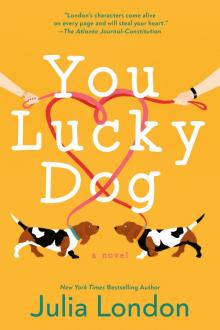 You Lucky Dog
You Lucky Dog The Devil in the Saddle
The Devil in the Saddle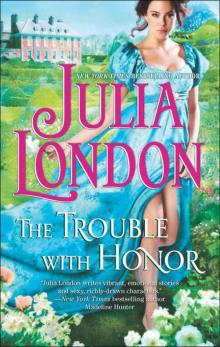 The Trouble with Honor
The Trouble with Honor Tempting the Laird
Tempting the Laird The Secret Lover
The Secret Lover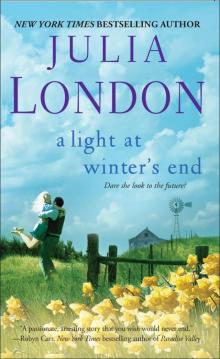 A Light at Winter’s End
A Light at Winter’s End The Charmer in Chaps
The Charmer in Chaps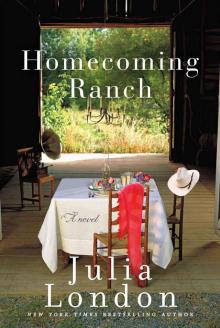 Homecoming Ranch
Homecoming Ranch Jack (7 Brides for 7 Soldiers Book 5)
Jack (7 Brides for 7 Soldiers Book 5) A Courtesan's Scandal
A Courtesan's Scandal Hard-Hearted Highlander--A Historical Romance Novel
Hard-Hearted Highlander--A Historical Romance Novel The Complete Novels of the Lear Sister Trilogy
The Complete Novels of the Lear Sister Trilogy The Last Debutante
The Last Debutante Suddenly Single (A Lake Haven Novel Book 4)
Suddenly Single (A Lake Haven Novel Book 4) Seduced by a Scot
Seduced by a Scot Highlander Unbound
Highlander Unbound Suddenly Dating (A Lake Haven Novel Book 2)
Suddenly Dating (A Lake Haven Novel Book 2) The Bridesmaid
The Bridesmaid The Seduction of Lady X
The Seduction of Lady X One Mad Night
One Mad Night Extreme Bachelor
Extreme Bachelor The Scoundrel and the Debutante
The Scoundrel and the Debutante The Revenge of Lord Eberlin
The Revenge of Lord Eberlin American Diva
American Diva The Lovers: A Ghost Story
The Lovers: A Ghost Story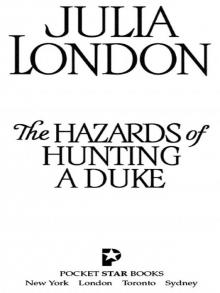 The Hazards of Hunting a Duke
The Hazards of Hunting a Duke Return to Homecoming Ranch (Pine River)
Return to Homecoming Ranch (Pine River)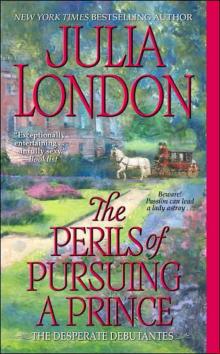 The Perils of Pursuing a Prince
The Perils of Pursuing a Prince Highlander in Love
Highlander in Love The Devil Takes a Bride
The Devil Takes a Bride Devil in Tartan
Devil in Tartan Wild Wicked Scot
Wild Wicked Scot Snowy Night with a Highlander
Snowy Night with a Highlander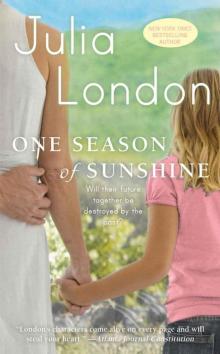 One Season of Sunshine
One Season of Sunshine Summer of Two Wishes
Summer of Two Wishes All I Need Is You aka Wedding Survivor
All I Need Is You aka Wedding Survivor Sinful Scottish Laird--A Historical Romance Novel
Sinful Scottish Laird--A Historical Romance Novel Suddenly Engaged (A Lake Haven Novel Book 3)
Suddenly Engaged (A Lake Haven Novel Book 3) Highlander in Disguise
Highlander in Disguise Suddenly in Love (Lake Haven#1)
Suddenly in Love (Lake Haven#1)